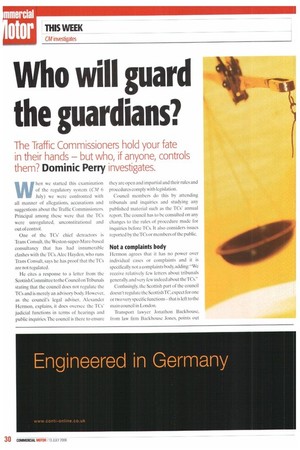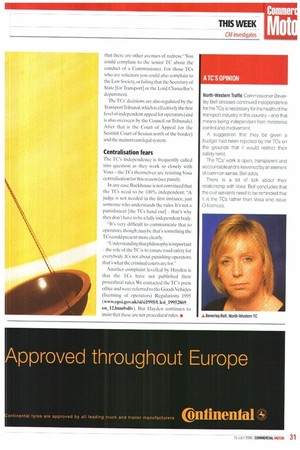Who will guard the guardians?
Page 30

Page 31

If you've noticed an error in this article please click here to report it so we can fix it.
The Traffic Commissioners hold your fate in their hands — but who, if anyone, controls
them? Dominic Perry investigates.
When we started this examination of the regulatory system (CM 6 July) we were confronted with all manner of allegations, accusations and suggestions about the Traffic Commissioners. Principal among these were that the TCs were unregulated, unconstitutional and out of control.
One of the TCs' chief detractors is Trans Consult, the Weston-super-Mare-based consultancy that has had innumerable clashes with the TCs. Alec Hayden, who runs Trans Consult, says he has proof that the TCs are not regulated.
He cites a response to a letter from the Scottish Committee to the Council on Tribunals stating that the council does not regulate the TCs and is merely an advisory body. However, as the. council's legal adviser, Alexander Hermon, explains, it does oversee the TCs' judicial functions in terms of hearings and public inquiries. The council is there to ensure they are open and impartial and their rules and procedures comply with legislation.
Council members do this by attending tribunals and inquiries and studying any published material such as the TCs annual report. The council has to be consulted on any changes to the rules of procedure made for inquiries before TCs. It also considers issues reported by the TCs or members of the public.
Not a complaints body Hermon agrees that it has no power over individual cases or complaints and it is specifically not a complaints body, adding: "We receive relatively few letters about tribunals generally, and very few indeed about the TCs."
Confusingly, the Scottish part of the council doesn't regulate the ScottishTC,expect for one or two very specific functions — that is left to the main council in London.
Transport lawyer Jonathon Backhouse, from law firm Back house Jones, points out that there are other avenues of redress: "You could complain to the senior TC about the conduct of a Commissioner. For those TCs who are solicitors you could also complain to the Law Society, or failing that the Secretary of State ]for Transport] or the Lord Chancellor's department.
The TCs decisions are also regulated by the Transport Tribunal, which is effectively the first level of independent appeal for operators (and is also overseen by the Council on Tribunals). After that is the Court of Appeal (or the Scottish Court of Session north of the border) and the mainstream legal system.
Centralisation fears
The TC's independence is frequently called into question as they work so closely with Vosa the TCs themselves are resisting Vosa centralisation for this reason (see panel).
In any case. Backhouse is not convinced that the TCs need to be 100% independent: "A judge is not needed in the first instance, just someone who understands the rules. Its not a punishment [the TCs hand out] that's why they don't have to be a fully independent body.
"It's very difficult to communicate that to operators. though; maybe that's something the TCs could present more clearly "Understanding that philosophy is important the role of the TC is to ensure road safety for everybody. It's not about punishing operators; that's what the criminal courts are for."
Another complaint levelled by Hayden is that the TCs have not published their procedural rules. We contacted the TC's press office and were referred to the Goods Vehicles (licensing of operators) Regulations 1995 (www.opsigov.uk/silsi1995/Uksi_19952869_ en_12.htm#sdiv). But Hayden continues to insist that these are not procedural rules. •
































































































































































































